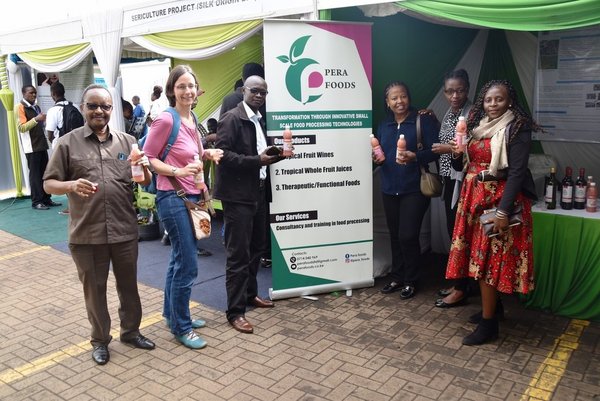 Read this article in French
Read this article in French- Share this article
- Subscribe to our newsletter
“Hidden hunger” despite surplus of fruit and vegetables
In East Africa, up to 50 per cent of the fruit and vegetables that have been grown cannot be made use of, one of the reasons being that they perish too quickly before or after harvesting. At the same time, the population are suffering from micronutrient deficiency, also known as “hidden hunger”, a condition which could be mitigated by more consumption of fruit and vegetables.
The international research project “Fruits and Vegetables for all Seasons” (FruVaSe), which the University of Göttingen in Germany is in charge of, has examined whether local and so far little researched fruit and vegetable varieties can be processed and made non-perishable, so that a greater proportion of the harvest is available as food. The project team presented the results and the products developed in a special June edition of “Ernährung im Fokus” and in other journals.
Local fruit, such as guavas in Kenya, partly rots beneath trees during the season, while guava juice is made out of fruit imported by this country. Therefore, one of the FruVaSe project’s goals was to produce non-perishable fruit which is rich in nutrients and can also contribute to a balanced diet outside the season.
In Kenya, in the context of the project, guava nectar enriched with moringa leaves was produced, and a black-eyed pea instant soup was developed. In Tanzania, the researchers modelled the contribution of various fruit and vegetable products from the food range consumed by women and children in the country and demonstrated that with the newly processed, non-perishable vegetable produce, gaps in nutrient supply could be filled and, partly, the cost of food could even be reduced.
Use of residual products for animal feed
Furthermore, the team established consumer demand and the use of processing waste as animal feed and for biogas and bio-coal production. As a contribution to a sustainable life-cycle concept, the researchers were able to demonstrate that scraps from the processing of jackfruit in Uganda could be used to manufacture bio-coal, which in turn can be applied as fertiliser for vegetable crops. The project results are now available as manuals, leaflets and posters in the local communities in Kenya, Tanzania and Uganda.
Project coordinator Dr Gudrun Keding of the University of Göttingen’s Department of Crop Sciences says that in addition to the dissemination of processing technologies, especially in rural areas, one further important goal of the research project is the formulating of recommendations for nutritious processed fruit and vegetables which can be adopted in national food directives.
Scientists from Kenya, Tanzania and Uganda as well as Erfurt University of Applied Science and the University of Göttingen cooperated in the FruVaSe Project, which was funded by Germany’s Federal Ministry of Food and Agriculture.
(University of Göttingen/wi)
More information:





Add a comment
Be the First to Comment